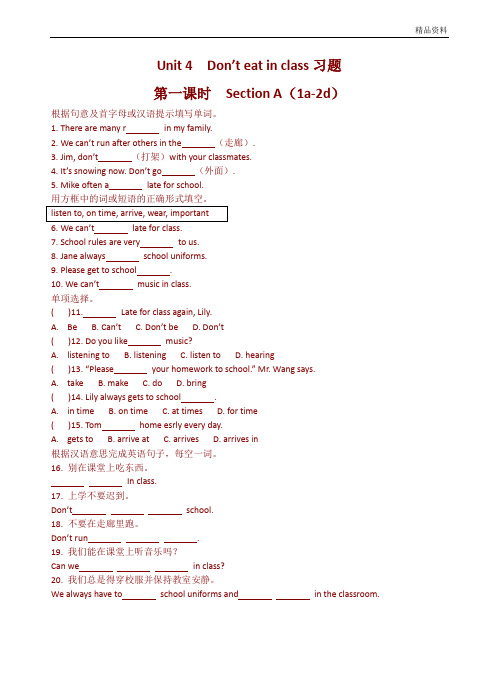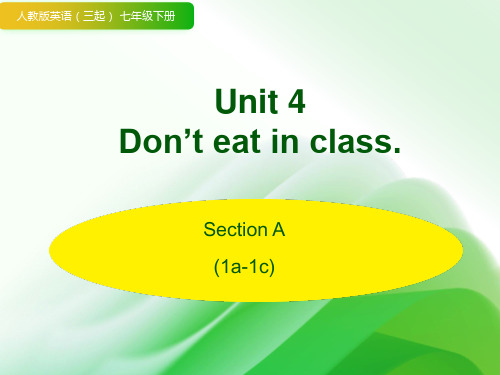英语人教版七年级下册unit4 section1a-1c
2014人教版新目标英语七年级下Unit 4 Section A(1a-1c)

How does Tony get to school? He gets to school by bike. __________________________________
Possible questions and answers:
1. How far is it from Tony’s home to school? ___________________________ It’s seven kilometers. 2. How long does it take Tony to get to It takes about ten minutes. school? ___________________________ 3. How does Mary get to school? She gets to the library by bus. ___________________________
Look at the chart below. Write at least 2 five questions. Then answer the questions with the information in the chart.
Who Where How How far How long
Tony from home to by bike 5 km 20 minutes school Mary from home to by bus 15 km 40 minutes the library
1
Use the words in the boxes to form as many expressions as possible.
take a bus, by bus, take a train, by train _________________________
Unit4SectionA1a1c课件人教版英语七年级下册

个人抢答 +2分
We can’t run in the hallways. Don’t run in the hallways.
个人抢答 +2分
We can’t arrive\be late for class.
2. What about Amy? Is it OK to eat in the classroom? She’s eating in the classroom. It’s not OK.
3. What rule is Mike breaking?
He’s listening to music in class.
Don’t arrive\be late for class.
个人抢答 +2分
We can’t fight. Don’t fight .
She is eating an
Dave and Tom
apple .
They’re fighting .
What are thSeelyinadoing now (他
Can we fight at school? No, we can’t.
We can’t fight. Don’t fight .
个人抢答 +2分
We can’t listen to music in class. Don’t listen to music in class.
个人抢答 +2分
*图书馆规则* Don’t talk .
Don’t listen to music
Don’t eat or drink
2019人教版七年级英语下册Unit4_Don't_eat_in_class课件PPT(年春)教育物理

Don’t talk in class.
Don’t talk with each other in class. Stop talking in class.
Don’t play cards in school.
Don’t smoke .It’s bad for your health.
Don’t sleep in class.
Don’t fight. We can’t fight with others.
Grammar
1. 祈使句是表示请求、命令、叮嘱、号召、 劝告等的句子; 通常省略主语you; 句中谓语 动词用动词原形; 句尾一般用降调; 祈使句的
开头是动词原形。
祈使句有肯定和否定两种: e.g. Look out! 小心!
Don’t wear hats in class. Don’t dance in the classroom.
Wear a uniform.
Don’t listen to music in the classroom.
Listen to music in the music room.
Homework
Can we eat in class? No, we can’t.
Don’t eat in the classroom.
arrive late for class Can we arrive late for class? No, we can’t.
Don’t arrive late for class.
• Think about the family rules.
FAMILY RULES
Don’t talk loudly on the phone.
【最新】人教版七年级英语下册Unit 4 Don’t eat in class 习题

Unit 4 Don’t eat in class习题第一课时Section A(1a-2d)根据句意及首字母或汉语提示填写单词。
1. There are many r in my family.2. We can’t run after others in the (走廊).3. Jim, don’t (打架)with your classmates.4. It’s snowing now. Don’t go (外面).5. Mike often a late for school.用方框中的词或短语的正确形式填空。
t7. School rules are very to us.8. Jane always school uniforms.9. Please get to school .10. We can’t music in class.单项选择。
( )11. Late for class again, Lily.A.BeB. Can’tC. Don’t beD. Don’t( )12. Do you like music?A.listening toB. listeningC. listen toD. hearing( )13. “Please your homework to school.” Mr. Wang says.A.takeB. makeC. doD. bring( )14. Lily always gets to school .A.in timeB. on timeC. at timesD. for time( )15. Tom home esrly every day.A.gets toB. arrive atC. arrivesD. arrives in根据汉语意思完成英语句子,每空一词。
16. 别在课堂上吃东西。
In class.17. 上学不要迟到。
Don’t school.18. 不要在走廊里跑。
人教版七年级英语下册unit4 逐字稿

人教版七年级英语下册unit4 逐字稿Unit 4 Don't eat in class.Section A (1a-2d)一、教学目标:1. 语言知识目标:1) 能够掌控以下单词:rules, arrive, late, hall, dinning hall, listen, listen to, fight, sorry2) 能掌握以下句型:① Don't eat in class.② You must be on time.③ Eat in the dining hall.2. 学会用英语表达一些标志的含义。
3. 娴熟采用目标语言谈论对某些规章制度(校规、家规等)的观点二、教学重难点1. 教学重点:1) 肯定祈使句是省略掉主语的原形动词开头;2) 驳斥yaku则就是在确实yaku前加之“don’t”。
3) 情态动词must及have to在用法上的区别。
2. 教学难点:掌握祈使句的用法,并能听懂、会说一些简单的祈使句。
三、教学过程Ⅰ. Warming-up and revision用yaku恳请学生们顺利完成一系列动作:Please stand up/ sit down. Close the door, please. Look at me and listen to me.Don’t open your books. Don’t talk. Let’s begin our class.Ⅱ. 1aT: Now, Look at the picture on your textbook. Each of the students is breaking one of these rules. Please finish 1a.Ⅳ. ListeningNow let’s listen! What rules are these students breaking? Write the numbers after names?Ⅴ. Pair workRead the dialogue in 1cand work in pairs.Ⅵ. Listening1. First, let's read the sentences in 2a together. Now, let's listen to the recording. Check the activities Alan and Cindy talk about.2. Work on 2b: Listen to the recording again. Can Alan and Cindy do these activities? Circle can or can't above.Ⅶ. Pair work1. Suppose you are Alan and your partner is Cindy. Talk about the rules in 2a.2. Let some students come to the front and act out the conversations.Ⅷ. Role-playRead the conversation and find some rules in this school. Ss read the conversations and find the answers to this question.( Don't be late for school. Don't bring music players to school. You always have to wear the school uniform. You have to be quiet in the library. )Homework:1. Remember the new words and expressions.2. 顺利完成以下句型切换试题1)I can play computer games on weekends.(一般疑问句)_________________________________? Yes, ____________.2) He has to wear uniform.(变否定句) He _____ _____ _____ wear uniform.3) I have to wear sneakers for gym class.(通常疑问句)_____ you ____ ____ wear sneakers for gym class? Yes, I ____.4) They have to wash clothes.(回答) ____ do they have ____ ____?5) You can’t go out on school nights.(换一种表达) _______ go out on school nights.6) Don’t talk in class.(同上) No _________.Section A (Grammar Focus-3c)教学重难点1. 教学重点:1) 稳步自学采用目标语言谈论对某些规章制度(校规、家规等)的观点2) 通过不同方式的练习方式来学会用英语表达一些标志的含义。
人教版英语七年级下册Unit4Don’teatinclassSectionA(1a1c)教学设计

四、教学内容与过程
(一)导入新课
1.热身活动:教师通过播放一首英文歌曲,如"Do Re Mi"或"ABC",让学生跟随音乐一起唱,营造轻松愉快的课堂氛围,同时激活学生的英语学习兴趣。
2.图片展示:呈现一组与课堂行为相关的图片,如学生在课堂上吃零食、讲话、睡觉等。引导学生用英语描述图片内容,为新课的学习做好铺垫。
2.听力练习:学生回家后,听Section A (1a-1c)的录音,并跟读对话,家长签字确认,以提高学生的听力理解和口语表达能力。
3.规则清单:每位学生制作一份个人的“日常行为规则清单”,列出至少五条自己认为在校园内应该遵守的规则,并简单说明理由。
4.家庭作业:完成课本练习册中与本节课相关的练习题,包括填空、选择和简答题,以巩固对语法知识的应用。
三、教学重难点和教学设想
(一)教学重难点
1.重点:本节课的重点在于学生对一般现在时态的掌握,以及禁止做某事的否定表达"Don't +动词原形"。此外,学生需要熟练运用与课堂行为相关的动词词汇,如"eat", "sleep", "read", "talk", "run"等。
难点:如何让学生在实际对话中灵活运用一般现在时态和否定表达,特别是在创造性地编写新对话时,能够自然地使用所学知识。
3.学生能够听懂并准确跟读Section A中的对话,通过听力练习提高理解日常英语对话的能力。
4.学生能够运用所学知识,通过小组合作,创作新的对话场景,练习在实际情境中使用目标语言。
2020-2021年七年级下册人教版英语Unit4 第一课时 Section A(1a~1c)

二、根据句意及首字母写单词,补全句子或对话。 6.Jim,don't _a_r_r_iv_e_ late for school. 7.I like to _l_is_t_e_n_ to music before I go to bed. 8.—Can I dance in the music_h__a_ll_ ? —Yes,you can. 9.Don't _f_ig_h_t_ with your classmates. 10.I'm _s_o_r_ry__ I can't come to your birthday party.
五、阅读三所学校的规章制度,在以下每个句子后的横线上写下相应 的学校代码。
①No.1 Middle School ◆Don't run in the hallways. ◆Don't bring food into the classroom. ◆Don't listen to music in class. ◆You have to wear a uniform. ②No.2 Middle School ◆Don't bring food into the classroom. ◆Don't wear a hat in class. ◆You have to wear a uniform. ◆Don't go into the classroom without the teacher.
一、根据句意用所给词的适当形式填空。 1.—What are the _r_u_l_e_s_(rule)? —Well,we can't eat in class and can't arrive late for school. 2. _D__o_n_'t_r_u_n__ (not run)in the hallways,Tom! 3.—Does the boy __li_s_te_n__ (listen) to music? —Yes,he does. 4. _D_o_n_'_t_a_r_r_iv_e__ (not arrive)late for work. 5.We can't arrive late for class. We must __b_e(are)on time.
Unit+4++Section+A+1a-3c 人教版英语七年级下册

We can’t listen to music in the hallways, but we can listen to it outside.
2d Role-play the conversation.
Read the conversation and complete the sentences. 1.John’s new school has _a_l_o_t_o_f_r_u_l_e_s_ . 2.It’s important _t_o_b_e__o_n_t_im__e___ . 3.John can’t __b__ri_n_g___ music players to __s_c_h_o_o_l ___. 4.John_a_l_w_a_y_s__wears uniforms to school and _is__q_u_it_e__
1c Student A is a new student. Student B
tells Student A about the rules above.
What are the rules?
Hale Waihona Puke Well, we can’t arrive late for class. We must
be on time.
3. _√__ listen to music outside 4. _√__ eat in the classroom
5. _√__ eat in the dining hall 6. ___ eat outside
7. _√__ wear a hat
8. _√__ fight
2b Listen again. Can Alan and Cindy do these
- 1、下载文档前请自行甄别文档内容的完整性,平台不提供额外的编辑、内容补充、找答案等附加服务。
- 2、"仅部分预览"的文档,不可在线预览部分如存在完整性等问题,可反馈申请退款(可完整预览的文档不适用该条件!)。
- 3、如文档侵犯您的权益,请联系客服反馈,我们会尽快为您处理(人工客服工作时间:9:00-18:30)。
Unit 4 Don’t eat in class.
重点解析:
1、初步了解祈使句:
祈使句表示命令、请求、劝告、征求对方意见等,一般省略主语(you)。
A.肯定祈使句一般以动词原形开头:
Run in the hallways.
B.祈使句的否定形式一般在动词原形前加_________:
___________ run in the hallways.
1、在常见的英文公共标识中,常用“No+名词/动名词”短语来表示禁止的事情。
No food! 禁止带食品!No photos! 禁止拍照!
No visitors! 禁止游人!No entry! 禁止入内!
No talking! 禁止交谈!No smoking!禁止吸烟!
No parking! 禁止停车!No spitting!禁止随地吐痰!
2、巧记“看”的用法
看电影要用see, 读书看报用read;
电视戏剧和比赛,要用watch来观看。
重点词组:
1. school rules _______________
2. arrive late for class __________
3. (be) on time _______________
4. in the hallways _____________
5. eat outside ________________
6. 不得不__________________
7. 穿校服__________________ 8. 保持安静________________
11. 不必____________________ 12. go out _________________
12. do the dishes_____________ 14. make your bed _____________ 15. be strict with sb. __________ 16. keep my hair short __________
课堂练习:
一、单选
()1. If you arrive late _______ class, you must say _______ to your teacher.
A. for, thanks
B. for, sorry
C. to, sorry
()2. — Can you sing in the classroom?
— _________________
A. Yes, you can.
B. No, I can.
C. Yes, we can.
()3. Don’t arrive late. You must be ________ time.
A. to
B. on
C. at
()4. Please listen _______ the teacher carefully (认真地).
A. to
B. on
C. at
()5. Don’t _______ TV after class.
A. watch
B. watches
C. watching
()6. —What are the school rules?
—We _______ listen to music in class.
A. don’t
B. can’t
C. aren’t
()7. Don’t________ class.
A. be late
B. late for
C. be late for
()8. I have to _______ the room every morning.
A. clean
B. cleans
C. cleaning
()9. Don’t listen music in the classroom hallways.
A. to; and
B. to; or
C. at; or
()10. She lost her bike. She _______ walk to school.
A. have to
B. has to
C. has
()11. We ________to wear the school uniform every day.
A. not have
B. have not
C. don’t have
()12.—_________you have to wear a hat today? — No, we don’t.
A. Are
B. Can
C. Do
()13. I can’t relax_______.
A. too
B. also
C. either
()14. There are too many ________ in the kitchen.
A. vegetables
B. milk
C. rice
()15. — _________. Your father is sleeping in the room.
— Oh, sorry.
A. Not talk
B. Not talking
C. No talking
二、阅读:阅读下面的短文,选择正确的答案。
(A)
Dear Dave,
I’m not happy. There are too many rules in my house. It isn’t fair. I have to get up at five o’clock every morning. I can’t arrive late for school. I have to be there at eight o’clock. I have to come back home after school because I have to do my homework. In the evening I can’t watch TV because I have to help my mother make dinner and wash the dishes. I have to go to bed before ten o’clock. On weekends, I have to stay at home on Saturday morning. I have to clean my room and wash my clothes by eleven o’clock. On Saturday afternoon, I have to go to the children’s palace
to learn the piano. Do you have lots of rules? Are they fair?
Your friend,
Alice
( )1. Who is the letter from?
A. Dave.
B. Alice.
C. Alice’s mother.
( )2. What time does Alice have to get up?
A. Five o’clock.
B. Eight o’clock.
C. Ten o’clock.
( )3. What does Alice have to do on Saturday morning?
A. Wash the dishes.
B. Wash her clothes.
C. Learn the piano. ( )4. Why does she go to the chi ldren’s palace?
A. To play football.
B. To learn math.
C. To learn piano.
(B)
We have different kinds of rules in our classroom. As a student we must follow them.
Students can not bring food into the classroom because our classroom is a place for us to study. The food may make our classroom dirty. And we can’t study well when one is eating.
Don’t run or fight in the classroom. It’s quite dangerous because we may get hurt(受伤的).
We need a quiet place for study. Don’t listen to mu sic in the classroom. Listening to music may disturb (打扰) others.
( ) 1.How many rules are mentioned(提到) in the passage?
A. Two.
B. Three.
C. Five.
( ) 2. We can __________ in the classroom.
A. listen to music
B. speak
C. run
( ) 3. Which is the best title(标题) for the passage?
A. The Rules in Our Home
B. The Rules in Our Classroom
C. Don’t Eat in the Classroom。
